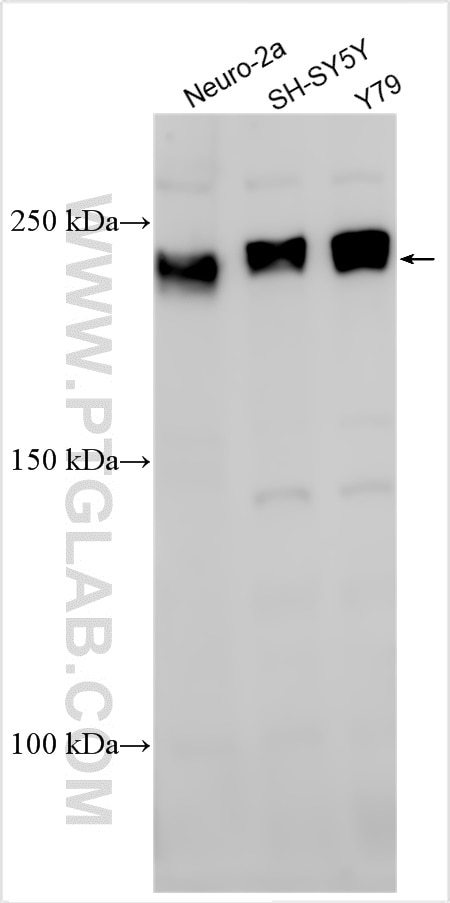Tested Applications
| Positive WB detected in | Neuro-2a cells, SH-SY5Y cells, Y79 cells |
Recommended dilution
| Application | Dilution |
|---|---|
| Western Blot (WB) | WB : 1:500-1:1000 |
| It is recommended that this reagent should be titrated in each testing system to obtain optimal results. | |
| Sample-dependent, Check data in validation data gallery. | |
Product Information
11982-1-AP targets ROBO3 in WB, ELISA applications and shows reactivity with human, mouse samples.
| Tested Reactivity | human, mouse |
| Host / Isotype | Rabbit / IgG |
| Class | Polyclonal |
| Type | Antibody |
| Immunogen | ROBO3 fusion protein Ag2608 Predict reactive species |
| Full Name | roundabout, axon guidance receptor, homolog 3 (Drosophila) |
| Calculated Molecular Weight | 148 kDa |
| Observed Molecular Weight | 200-250 kDa, 148 kDa |
| GenBank Accession Number | BC008623 |
| Gene Symbol | ROBO3 |
| Gene ID (NCBI) | 64221 |
| RRID | AB_10643388 |
| Conjugate | Unconjugated |
| Form | Liquid |
| Purification Method | Antigen affinity purification |
| UNIPROT ID | Q96MS0 |
| Storage Buffer | PBS with 0.02% sodium azide and 50% glycerol, pH 7.3. |
| Storage Conditions | Store at -20°C. Stable for one year after shipment. Aliquoting is unnecessary for -20oC storage. 20ul sizes contain 0.1% BSA. |
Background Information
ROBO3 belongs to the immunoglobulin superfamily and ROBO family. ROBO3 is thought to be involved during neural development in axonal navigation at the ventral midline of the neural tube. In spinal cord development, it plays a role in guiding commissural axons probably by preventing premature sensitivity to Slit proteins thus inhibiting Slit signaling through ROBO1. It is required for hindbrain axon midline crossing. Defects in ROBO3 are a cause of familial horizontal gaze palsy with progressive scoliosis (HGPPS).
Protocols
| Product Specific Protocols | |
|---|---|
| WB protocol for ROBO3 antibody 11982-1-AP | Download protocol |
| Standard Protocols | |
|---|---|
| Click here to view our Standard Protocols |



